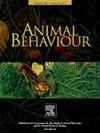汉密尔顿法则预测了野生昆虫种群中同类相食的现象
IF 2.1
2区 生物学
Q2 BEHAVIORAL SCIENCES
引用次数: 0
摘要
尽管它在进化生物学中具有开创性的地位,但充分评估自然系统中汉密尔顿规则的不同组成部分的实证研究仍然有限。部分原因是,与相对容易量化的亲缘关系相比,很难量化特定行为对行为者和接受者的成本和收益。同胞同类相食代表了一个难得的机会,成本和收益可以更容易地量化,特别是因为被同类相食的个体的适合度为零。我们表明,用野生的一岁星Lygaeus creticus种子虫来参数化汉密尔顿兄弟同类相食的规则,预测了观察到的同类相食行为:同卵被同类相食而不考虑亲缘关系,但吃掉同卵的巨大生存利益超过了吃掉近亲的任何整体适应性损失。此外,我们还发现,相对于异种的pandurus卵,L. creticus若虫更倾向于吞食同种的卵,但这种偏好取决于孵化环境。这表明学习在同类相食偏好的表达中扮演着潜在的角色,将生态学添加到汉密尔顿法则的进化背景中。本文章由计算机程序翻译,如有差异,请以英文原文为准。
Hamilton's rule predicts sibling cannibalism in a wild population of insects
Despite its seminal status in evolutionary biology, empirical studies that fully assess the different components of Hamilton's rule in natural systems remain limited. This is in part due to the difficulty of quantifying the costs and benefits to the actor and recipient of a given behaviour, compared with the relative ease of quantifying relatedness. Sibling cannibalism represents a rare opportunity where the costs and benefits can be more easily quantified, in particular, because the cannibalized individual achieves zero fitness. We show that parameterizing Hamilton's rule for sibling cannibalism by wild first instar Lygaeus creticus seed bugs predicts the observed cannibalism behaviour: conspecific eggs are cannibalized without regard to relatedness, but the large survival benefit of eating a conspecific egg outweighs any loss of inclusive fitness from eating kin. In addition, we show that L. creticus nymphs prefer to cannibalize conspecific eggs over heterospecific Spilostethus pandurus eggs but that this preference depends on hatching environment. This suggests a potential role of learning in the expression of cannibalism preferences, adding ecology to the evolutionary context of Hamilton's rule.
求助全文
通过发布文献求助,成功后即可免费获取论文全文。
去求助
来源期刊

Animal Behaviour
生物-动物学
CiteScore
4.60
自引率
8.00%
发文量
236
审稿时长
10.2 weeks
期刊介绍:
Growing interest in behavioural biology and the international reputation of Animal Behaviour prompted an expansion to monthly publication in 1989. Animal Behaviour continues to be the journal of choice for biologists, ethologists, psychologists, physiologists, and veterinarians with an interest in the subject.
 求助内容:
求助内容: 应助结果提醒方式:
应助结果提醒方式:


